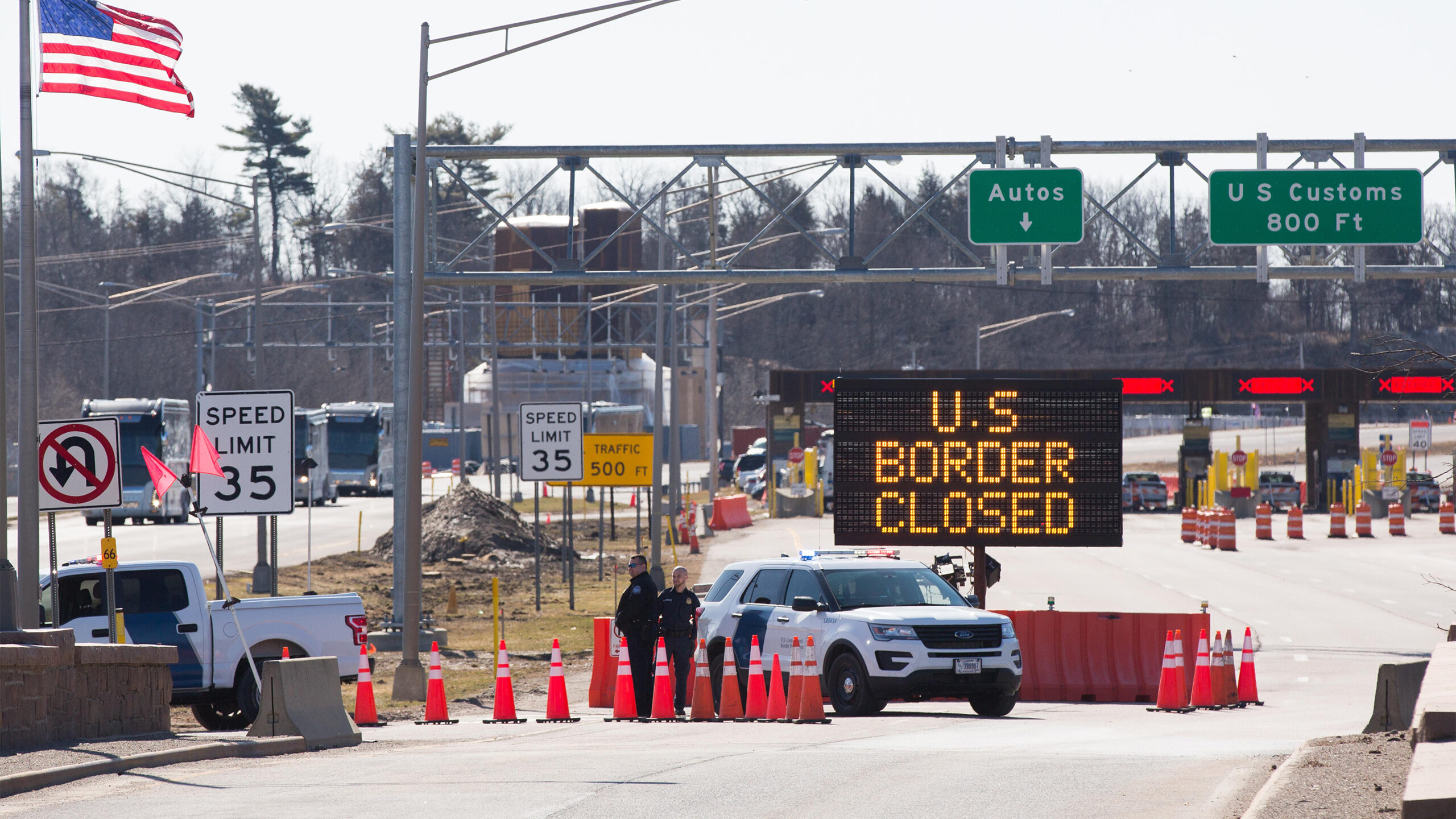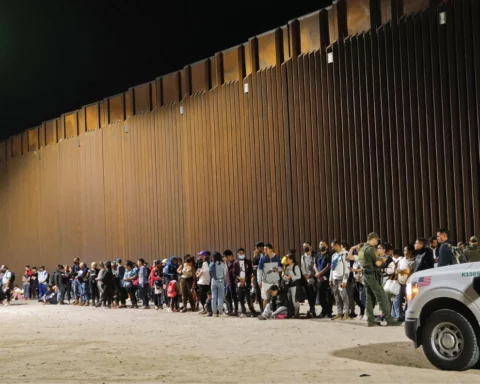The border security that President Trump built, President Biden has quickly torn down. Trump put Americans first with immigration policies that secured the border, enforced our laws, and brought integrity back to our immigration system. President Biden has quickly dismantled those effective policies, opened the border, stopped immigration enforcement, and brought chaos to our immigration system, prioritizing illegal aliens over Americans.
The table below tracks actions taken by the Biden Administration in 22 areas of immigration policy and will be updated as the administration takes more actions.
Trump Adminsitration
Biden Administration
The Trump Administration completed over 452 miles of border wall system of physical barriers, access roads, lighting, and advanced technologies for effective border security. Wall funds included congressional appropriations, Treasury forfeitures, and Defense military construction.
Under the “Remain-in-Mexico” program, migrants coming to the southern border and claiming fear remained in Mexico to await their asylum court hearings. When future migrants learned they could no longer enter the U.S. and disappear into the interior after claiming fear, the caravans stopped and the border numbers decreased.
In 2019, President Trump reached a series of agreements with El Salvador, Guatemala, and Honduras to enforce their respective borders, build up their asylum systems, accept return of foreign nationals, and reduce illegal immigration to the U.S.
In 2019, DOJ and DHS published a joint interim final rule that generally barred aliens from applying for asylum in the U.S. if they had transited through a safe country, but did not seek asylum there, on their way to the U.S.
The Trump administration prosecuted those who facilitated birth tourism and stopped issuing visas to aliens traveling to the United States to give birth in the United States to gain American citizenship for their children.
The Trump administration made considerable changes to the Executive Office for Immigration Review to reduce the backlog of cases waiting to be heard in immigration court. These changes increased the number of cases completed in a year from 163,080 in 2017 to 276,945 in 2019.
DHS published a final rule defining “public charge” as an alien who receives one or more designated public benefits for more than 12 months, in the aggregate, within any 36-month period. Public charge aliens have been inadmissible going back to the 1800s based on the concept that immigrants should be self-reliant.
The Trump Administration attempted to rescind the Obama Administration’s DACA program because it was an unconstitutional use of executive power to grant general amnesty. Courts ordered the Administration to continue adjudicating DACA renewals, but the Administration did not adjudicate new DACA requests.
President Trump restricted travel from 13 countries that are state sponsors of terrorism, provide safe havens for terrorists, or fail to provide travel information to U.S. authorities. Supreme Court Chief Justice John Roberts wrote the majority opinion, upholding the restrictions based on the Administration’s thorough vetting of 200 countries.
President Trump ordered that federal grants not be awarded to jurisdictions that refuse to cooperate with ICE to remove criminal aliens. This order was challenged in the courts with various results and had not been settled by the Supreme Court.
President Trump terminated TPS for El Salvador, Haiti, Honduras, Nepal, Nicaragua, and Sudan, which had country designations for many years, contrary to the “temporary” intent. The terminations were challenged in court and DHS was ordered to continue providing the protection and work authorization, despite the law clearly stating there shall be no judicial review.
On January 19, 2021, President Trump directed DHS to provide Deferred Enforced Departure and work authorization to Venezuelan nationals residing in the U.S. by January 20, 2021.
President Trump terminated TPS for El Salvador, Haiti, Honduras, Nepal, Nicaragua, and Sudan, which had country designations for many years, contrary to the “temporary” intent. The terminations were challenged in court and DHS was ordered to continue providing the protection and work authorization, despite the law clearly stating there shall be no judicial review.
On January 19, 2021, President Trump directed DHS to provide Deferred Enforced Departure and work authorization to Venezuelan nationals residing in the U.S. by January 20, 2021.
The Trump Administration announced it would include a question on the 2020 Census asking whether respondents are U.S. citizens.
Several Board of Immigration Appeals cases clarified the meaning of “particular social group” in asylum cases to end overbroad interpretations of the concept.
DOJ and DHS issued a final rule that barred certain criminal aliens from asylum eligibility, including those convicted of federal or state felonies, illegal reentry, alien smuggling or harboring, street gang crime, drunk driving, domestic violence, or certain misdemeanors (e.g., offenses related to false identification, unlawful receipt of public benefits, or possession or trafficking of controlled substances or paraphernalia).
Because illegal aliens frequently file frivolous asylum applications to obtain work authorization, DHS issued a rule that increased the wait time for work authorization from 180 days to 365 days and established new eligibility requirements.
President Trump lowered the Obama Administration’s refugee admission ceiling in 2017 from 110,000 to 50,000 to improve the security of the vetting process. He lowered the ceiling each subsequent year to a low of 15,000 to redirect resources to adjudicating the asylum case backlog.
President Trump emphasized the law requiring communication between resettlement agencies and the local jurisdictions before resettling refugees. Trump’s executive order required states and localities to affirmatively state their desire to resettle refugees.
In 2017, President Trump issued an executive order ending the abuse of parole provisions and ensuring that parole was used on a case-by-case basis for humanitarian reasons, per the law.
In 2017, President Trump terminated the Obama Administration program, which had permitted parents lawfully but temporarily present in the U.S. to request access to the U.S. Refugee Admissions Program for their children. If a child was found ineligible for refugee admission, which most were, the child would still be considered for parole into the U.S. to reunite with the parent. The Obama Administration expanded the parole program to include spouses, parents, and caregivers of children.
The Trump Administration modified the H-1B visa program through Labor Department and DHS regulations to prevent fraud and protect American workers. Changes included: selecting more beneficiaries with advanced degrees; modifying the visa cap selection process from a lottery to petitions offering the highest wages; increasing the minimum required wage for H-1B employees; revising the definition of “specialty occupation;” and limiting the validity period of third-party placement petitions, all to align with the original intent that H-1B visas be used for specialty occupations and not entry level skills.
USCIS has not charged a fee for asylum applications or credible-fear asylum adjudications. Meanwhile, other fees have increased significantly to subsidize for asylum, credible fear, and other fee-exempt benefit applications. No longer able to justify such large fee increases, and to ensure asylum applicants had some vested commitment in their application,” USCIS issued a fee rule to charge a nominal $50 for asylum applications, which is in line with US treaty obligations, U.N. protocols, and similar to other countries’ asylum fees.
Jan. 20. President Biden proclaimed an end to the national emergency on the southern border, halted construction of the border wall and declared no more taxpayer money would be diverted to it, despite remaining congressional funds.
Jan. 20. President Biden issued an executive order for a strategy to bring MPP-registered aliens into the U.S.
Feb. 2. DHS suspended MPP.
Feb. 19. DHS started to process MPP-registered aliens into the U.S.
Feb. 2. President Biden ordered that the agreements with the Northern Triangle countries be reviewed to determine whether to suspend or terminate them.
Feb. 6. The State Department announced that the agreements are suspended and the process to terminate them had begun.
Feb. 2. President Biden directed the Secretary of Homeland Security to consider repealing the rule.
No change
The Biden Administration made personnel changes to revert to Obama Administration leadership. Also, the administration plans to hire additional immigration judges to reduce court backlog.
Feb. 2. President Biden has ordered a review of the public charge rule.
March 10. The Biden Administration announced that it will no longer defend the 2019 public charge rule in court challenges because it is not in the public interest, an efficient use of limited government resources, or in keeping with American values. The Administration is returning to the 1999 interim field guidance to adjudicate public charge issues.
Jan. 20. President Biden ordered the Secretary of Homeland Security to “preserve and fortify” DACA.
Jan. 20. The Biden Administration sent his immigration bill proposal to Congress, which included providing green cards immediately to aliens who entered the U.S. as minors.
Jan. 20. President Biden revoked the travel restrictions.
Jan. 20. President Biden revoked President Trump’s order.
Jan. 20. The Biden Administration sent his immigration bill proposal to Congress, which included providing green cards to aliens with TPS as of Jan. 2017.
March 8. The DHS designated Venezuela for TPS for 18 months, until September 2022. Venezuelan nationals residing in the U.S. by March 8, 2021, are eligible to apply for TPS, work authorization, and advance parole.
March 12. DHS designated Burma for TPS for 18 months until September 2022. Burmese nationals residing in the U.S. by March 11, 2021, are eligible to apply for TPS, work authorization, and advance parole.
Jan. 20. The Biden Administration sent his immigration bill proposal to Congress, which included providing green cards to aliens with TPS as of Jan. 2017.
March 8. The DHS designated Venezuela for TPS for 18 months, until September 2022. Venezuelan nationals residing in the U.S. by March 8, 2021, are eligible to apply for TPS, work authorization, and advance parole.
March 12. DHS designated Burma for TPS for 18 months until September 2022. Burmese nationals residing in the U.S. by March 11, 2021, are eligible to apply for TPS, work authorization, and advance parole.
Jan. 20. President Biden revoked President Trump’s order.
Feb. 2. President Biden ordered a review to determine whether the decisions of these cases are consistent with international standards.
President Biden requested Congress codify the 180-day waiting period for work authorization.
No change.
Feb. 4. President Biden issued an executive order revoking the heightened screening put in place by the Trump Administration. He seeks to raise the admissions ceiling to 62,500 for the remainder of fiscal year 2021 and to 125,000 in fiscal year 2022.
Feb. 4. President Biden revoked the Trump executive order that sought express consent by states and localities for refugee resettlement.
Feb. 2. President Biden revoked Executive Order 13767. He also seeks to use parole as a group benefit for such populations as parents who were removed during the Trump Administration.
Feb. 2. President Biden issued an executive order ordering the Central American Minor parole programs to be restarted.
Feb. 4. USCIS announced that it is delaying the visa cap selection process effective Dec. 31, 2021.
Jan. 25. President Biden removed President Trump’s “Hire American” from his “Buy American” Executive Order, which sought to protect American workers by ensuring H-1B visas went to the most skilled and highest paid petition beneficiaries.
Feb. 2. President Biden has ordered the rule creating this fee to be revised or rescinded.






